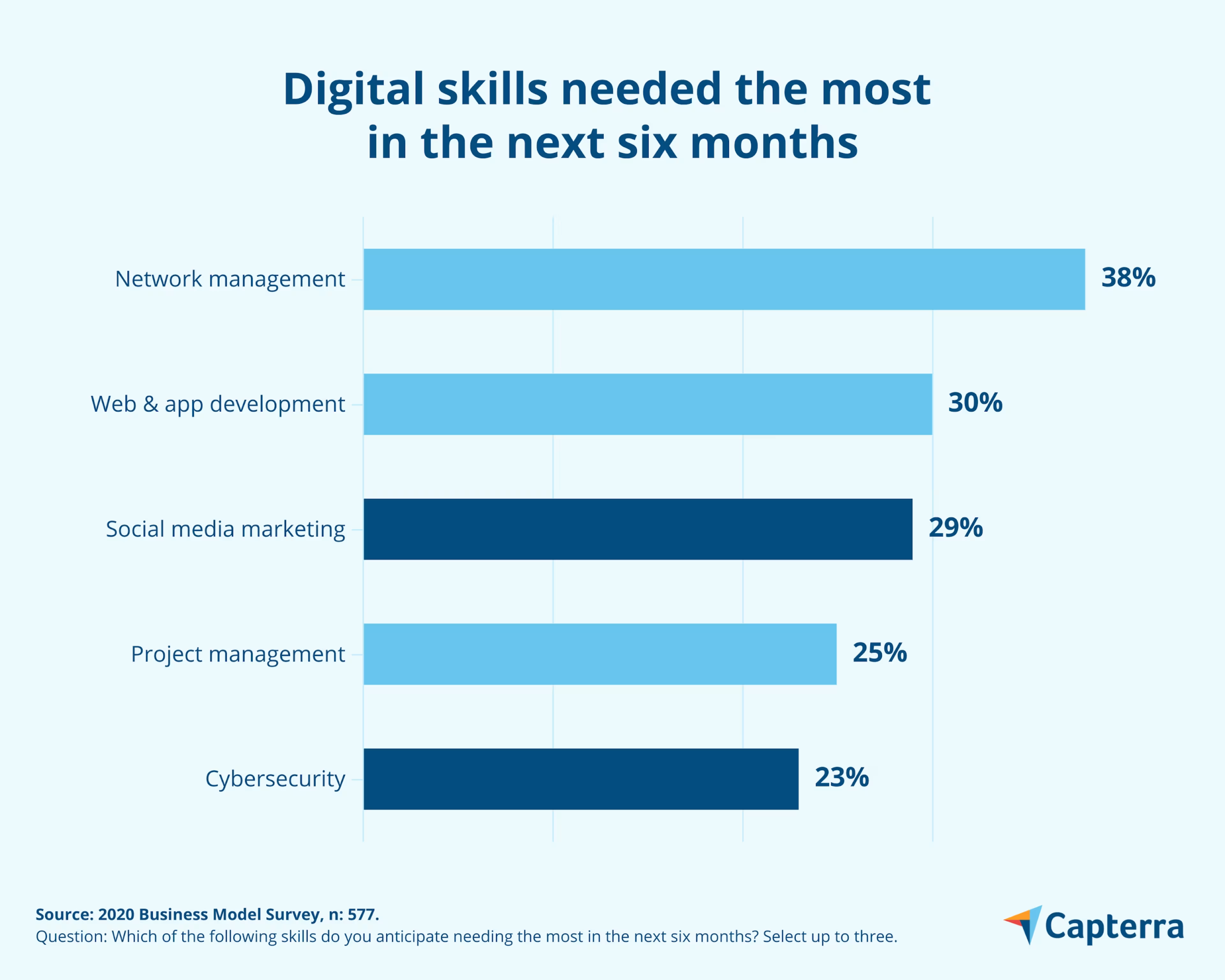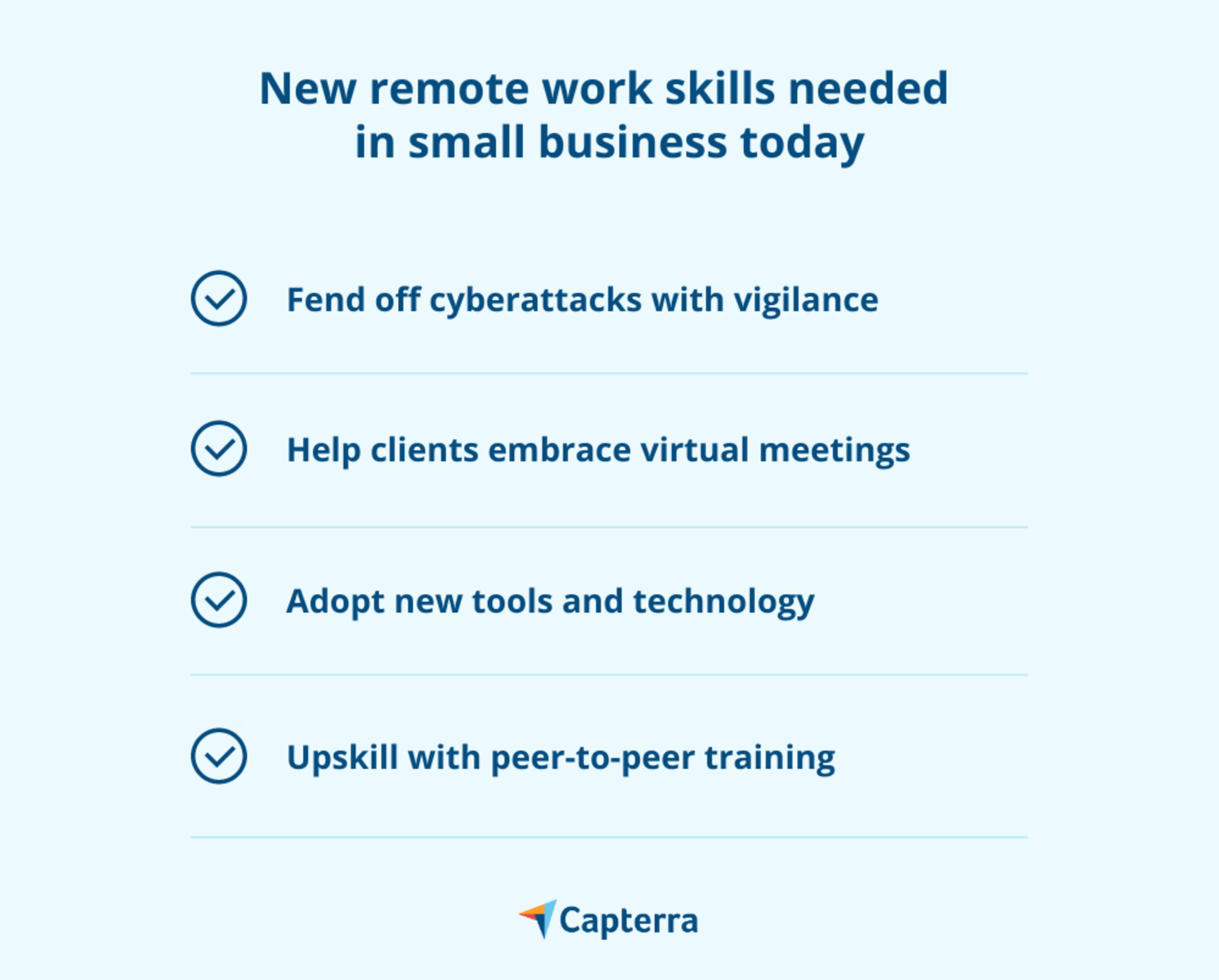Your business operates differently than it did pre-COVID-19. The job of customer service now requires a certain level of tech-savvy. An online storefront and marketing approach requires a different skill set than a brick-and-mortar business typically needs. And online payments and remote device security are likely new concerns you weren’t considering before.
All this means your remote workers need to work differently. But what exactly does this look like? And what new skills are needed now?
We surveyed* 577 small business leaders asking about the remote work skills they anticipate needing the most over the next six months. Below is a look at the top 5.
Two digital skills stood out to me as the most universal challenges businesses are facing now that we’re all working from home: cybersecurity at 23% and social media marketing at 29%.

To get more insight on these new skills needed I asked dozens of small business leaders to tell me their remote worker stories. In this article I'll highlight the challenges and solutions small business leaders have shared with me. Hopefully you find some inspiration and insight for your own digital acceleration.
Fend off new types of cyberattacks with cybersecurity vigilance
In our survey, of the businesses that did implement remote work since the start of the pandemic, 31% report security threats as their primary concern for remote workers.

Reuben Yonatan
CEO and founder of GetVoIP
GetVoIP is a cloud communication advisor helping businesses make informed decisions about Voice over Internet Protocol (VoIP) systems.
CEO of GetVoIP, Reuben Yonatan shares, "The most challenging part has been figuring out a comprehensive cybersecurity strategy. That includes everything from best practices to a tech upgrade. We quickly realized that without a cybersecurity solution that takes into account the security vulnerabilities posed by a distributed team, the chances of data breaches was high.”
A data breach costs a business approximately $8.19 million in the United States. But when we asked small business leaders what IT security software they've added in the past three months, a surprising 11% reported none. While your remote team is your first line of defense against security threats, every employee needs to be armed with cybersecurity skills to protect your newly remote company.
What you can do now:
Provide employees with endpoint security software and make sure it’s installed on the device(s) they actually use for work.
Instruct employees on password best practices and how to secure their home Wi-Fi networks.
Share IT security tips such as how to detect phishing emails and reminders to update passwords and make them complex often and regularly with your team.
Start your cybersecurity software search here with top-rated products and check out thousands of customer reviews.
Put hesitant clients at ease with virtual meeting etiquette
Business is changing—and so is the way you meet, greet, and interact with clients.

John Pinedo
Co-founder of Instinct Marketing
Instinct Marketing is a full-service digital marketing agency, dedicated to providing the best results for every client.
John Pinedo, co-founder of digital marketing agency Instinct Marketing shares, “The new normal doesn't allow us to network like we used to. Before COVID-19, my business partner and I would consistently go to networking events in our city and would book discovery calls with small businesses. Now that California is on lockdown (again), it's been challenging to get qualified leads through our sales funnel and expand our clientele.”
John sees that it's been tough for some business owners to get used to web conferencing tools and at times even email—many aren’t accustomed to their newly remote job. His team works with leaders who are just more accustomed to the old ways of communicating and struggle to accept the new remote work experience. He says, "We see the resistance every week." More business owners are dropping out of paid networking groups every week because they can't stand the new normal of virtual meetings.
As with cybersecurity, your team is your first and best resource to help clients become comfortable with virtual meetings and communicating fully online with you. Soft skills are evolving to meet the demands of the remote environment, but at the core it's still all about taking an inviting and warm approach.
What you can do now
Encourage your remote working team to empathize with clients, responding to virtual awkwardness like lagging with a light-hearted and warm approach.
Train each remote employee on how to troubleshoot common technical issues, such as checking and changing the audio settings.
Provide employees with templated instructions to give to clients on how to join virtual meetings and include a phone number they can call if they need help.
From network security to anti-spam protection, you can start your search for new cybersecurity software here. We’ve got thousands of user reviews and a helpful Network Security Buyer’s Guide so you can make an informed decision.
Embrace new technology to tackle new challenges
We all know that content, such as late night tv shows and music videos, is looking very different in the age of social distancing. And that’s ok. Embrace change within your business and recognize that the tools and technology your team has been using may not be the most apt for the moment.

Cristina Maria
Marketing executive at Commusoft
Commusoft is an award-winning provider of job management software for field service businesses around the world.
Cristina Maria, marketing executive at Commusoft, shares that prior to the pandemic lockdown her company had just invested significantly in video production tools, both for marketing purposes and for client services. When the team realized they wouldn't have access to the equipment and studio setting in the office, they had to come up with a new way to create social media content.
“The solution we found was, actually, Skype rather than Zoom due to its useful plugin called eCamm. This made it very easy for our videographer to capture multiple streams of video at the same time and continue producing our web series, Success in the Field.” When watching the series, you can see it's working out well.
“It's a testament to how far tech has gotten that we can still produce it without being in the same physical location or even having the right hardware.”
What you can do now
Don’t force it when it comes to using existing tools and hardware—needs have changed in this era of remote work and so have the tools that best serve them.
Encourage your teams to get creative so they can continue to provide services, engagement, and make sales while working remotely.
Be flexible in your expectations of what marketing content looks like: the new format may prove even better than what was planned.
Check out live streaming video software user reviews and a Buyer’s Guide to help you get started in your solution search.
Upskill with peer-to-peer training and cross training that promotes remote collaboration
In some cases, the skills one employee needs to develop are part of another employee's or team's expertise. Turn to your team to promote growth from within.

Bradley Steven
CEO at LLC Formations
LLC Formations’ sole focus is making business ownership easy for everyone by providing the insights, how-to’s, and support for each step of the company formation process.
At LLC Formations, CEO Bradley Stevens has focused on upskilling his team in order to get the new skills needed. This approach not only avoids furloughs or lay offs, but also strengthens the team’s commitment to the company. He shares that his teams “are learning new skills online to assist in other areas of business. Our employees whose departments are down temporarily and learning new skills are already familiar with the work environment.”
Investing in your business and your team at the same time with upskilling and training is a win-win and should be your first approach to filling the skills gap created in the new remote work environment. You’ll likely be surprised by how willing your team is to learn about other areas of the company, help each other learn, and proudly show their new skillset.
What you can do now
Provide ongoing training to help your team meet new challenges in their work in a sustainable and effective way.
Schedule peer-to-peer learning sessions, such as a “Lunch & Learn.” This approach not only provides cost-effective cross-training but also relationship building across the business.
Invest in a learning management software tool so employees can access training at the times in the work day that works best for them.
Looking for training software to help upskill your team? Check out our list of the Top 20 products, read our Buyer’s Guide, and read thousands of user reviews.
Together we’ll continue to learn and grow in this disruptive time
As your ally in digital pivots and virtual-based business strategies, we hope you found this article insightful. Before you go, here’s a summary of the key takeaways and a recommended reading list to help you continue building a successful remote workforce.
